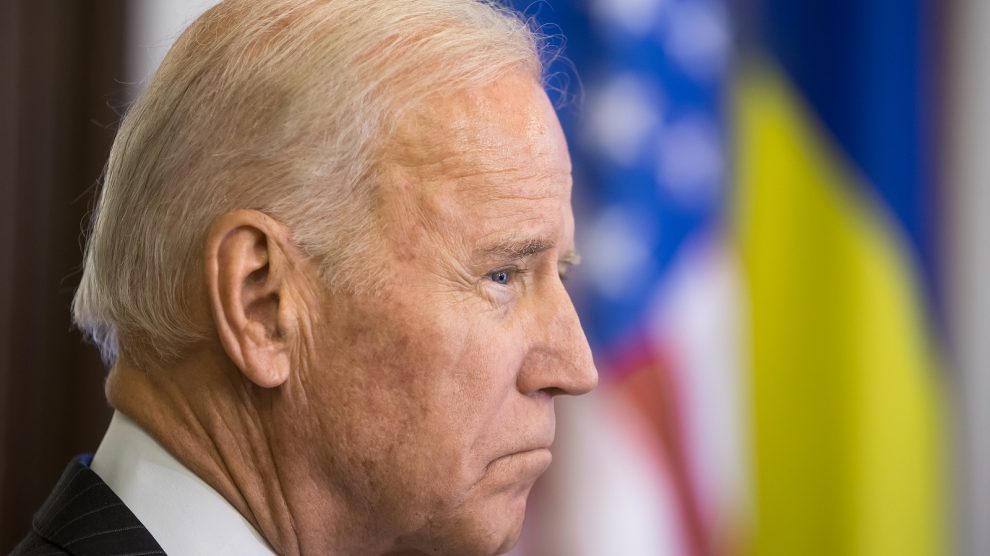Catch up quickly with the stories from Central and Eastern Europe that matter, this week led by the news that on Tuesday, the US finally passed support package for Ukraine.
Russia’s war on Ukraine
Joe Biden told Volodymyr Zelensky this week that he will “move quickly” to send Ukraine fresh military aid, after US lawmakers finally passed a 61 billion US dollars support package.
The House of Representatives approved the bill on Saturday after months of political gridlock in the chamber. The Senate then passed the bill on Tuesday.
Biden promise of “significant” support for Kyiv, including more air defences, came as Russian attacks destroyed a TV tower in Kharkiv.
Footage showed the red and white tower collapsing seconds after Russian missiles slammed into it on Monday afternoon in the eastern Ukrainian city, which lies just 30 kilometres from the Russian border.
Local officials said there were no casualties in the attack, with regional Governor Oleg Syniehubov writing on social media that staff were in a shelter at the time.
But Syniehubov said the attack had disrupted television broadcasting in the region.
On Thursday, the head of the UK military said that Ukraine is set to increase long-range attacks inside Russia as an influx of western military aid aims to help Kyiv shape the war “in much stronger ways”.
Admiral Sir Tony Radakin acknowledged the downbeat mood surrounding Ukraine’s defence in an interview with the Financial Times, admitting the country was facing a “difficult” fight to repel advancing Russian forces.
But Britain’s chief of defence, a key figure in the West’s military support for Kyiv, stressed that such a gloomy “snapshot” of the war failed to recognise longer trends more in Kyiv’s favour.
He said these included the latest packages of military aid from US and Europe, Ukraine’s increasingly successful long-range strikes, and Moscow’s “total failure” to choke off Kyiv’s vital grain exports via the Black Sea.
Ukraine this week moved to restrict consular services at its diplomatic missions for men of conscription age (18-60) who live abroad as Kyiv tries to increase troop levels in its fight to repel invading Russian forces.
Foreign Minister Dmytro Kuleba wrote on X, formerly Twitter, that he ordered the restrictions because “staying abroad does not relieve a citizen of his or her duties to the Homeland.”
“As it looks like now, a man of conscription age goes abroad and shows his state that he does not care about its survival. He then comes back and wants to receive services from this state. It does not work this way. Our country is at war,” Kuleba wrote.
He said the Ministry of Foreign Affairs would clarify the procedure for military-age men to obtain consular services soon.
Other news from the region
Opposition VMRO DPMNE-backed candidate, Gordana Siljanovska-Davkova, took 40.08 per cent of the vote in the first round of presidential elections in North Macedonia on Wednesday, far ahead of the incumbent, Stevo Pendarovski, endorsed by the ruling Social Democrats, who got 19.93 per cent. Since no candidate won more than 50 per cent, the two frontrunners will compete in a run-off on May 8, which will take place in parallel with a higher-stakes general election. Turnout in the first round of voting was 49.95 per cent.
Poland may join the five NATO countries which could deploy US-made tactical nuclear weapons on its fighters in a European armed conflict, Polish president Andrzej Duda said in a interview published on Monday. Duda, speaking with the Warsaw publication Fakt, voiced concerns that Russia has been “militarising” the enclave of Kaliningrad—its Switzerland-sized province on the Black Sea that borders Poland and Lithuania, but which is geographically cut off from Russia—and that this poses a direct threat to Poland. Russia claimed Kaliningrad from Germany as reparations following World War II.
Polish industrial output dropped more than expected in March, data released on Monday showed, raising concerns for the prospects for a solid rebound in emerging Europe’s biggest economy in 2024. Poland’s Ministry of Finance expects the economy to rebound by three per cent or more in 2024, supported by an economic recovery in core markets, including Germany and a rebound in domestic consumption on the back of strong wage growth. Poland’s industrial production fell in March by six per cent year-on-year, far beyond the two per cent drop expected by analysts.
Hungary further slowed the pace of cuts to the European Union’s highest key interest rate this week, with policymakers seeking to anchor the volatile forint in a riskier economic environment. The National Bank of Hungary reduced the benchmark interest rate by 50 basis points to 7.75 per cent on Tuesday, matching most forecasts. The unanimous decision compared with a 75 basis-point reduction in March and a full percentage point cut in February. A “careful and patient approach” is warranted at a time of greater investor risk aversion, Deputy Governor Barnabas Virag said at a press briefing.
A memorial to hundreds of Roma killed at a World War II concentration camp opened on Tuesday in Czechia at the site of the camp that became a pig farm during communist rule when the slaughter was nearly forgotten. Czech leaders gathered at a ceremony acknowledged that the country had taken too long to commemorate the suffering to its estimated 250,000 Roma citizens. “We are paying a societal debt that we have owed for decades to the victims of the Romani Holocaust and to all survivors,” President Petr Pavel said at the memorial near the village of Lety.
Bosnian police last Sunday raided multiple locations in Sarajevo in a large-scale antidrug operation that led to the arrest of 23 people, including several high-ranking Bosnian law enforcement officials suspected of close links with Edin Gacanin, a drug kingpin arrested in November 2022. The raids were conducted with the backing of EU and US law enforcement agencies. Those arrested are suspected of involvement in organised crime, money laundering, influence peddling, abuse of office, bribe taking, and the disclosure of classified information.
Armenia has agreed to return several villages to Azerbaijan in what both countries say is an important milestone as they edge towards a peace deal after fighting two wars since the collapse of the Soviet Union. Azerbaijani Ministry of Foreign Affairs spokesperson Aykhan Hajizada posted on the social media platform X last Friday that Armenia would return four villages near the countries’ shared border that had been “under occupation” since the early 1990s. The settlements are deserted but are strategically important because they are close to Armenia’s main highway north towards the border with Georgia.
Warner Music South East Europe (WM SEE) this week launched Balkan Electro, a new electronic dance music (EDM) focused label, which will give local talent across the Balkans and Ukraine a platform to get their music out to the world. Balkan Electro was formed in collaboration with Ensis Records, one of most significant EDM record labels in Eastern Europe, founded and owned by Alex Cristian, and will enable its roster to be distributed, upstreamed and marketed through the Warner Music owned label. WM SEE, WM Poland and Ensis Records will work together to sign new and exciting local talent to the label.
Unlike many news and information platforms, Emerging Europe is free to read, and always will be. There is no paywall here. We are independent, not affiliated with nor representing any political party or business organisation. We want the very best for emerging Europe, nothing more, nothing less. Your support will help us continue to spread the word about this amazing region.
You can contribute here. Thank you.







Add Comment